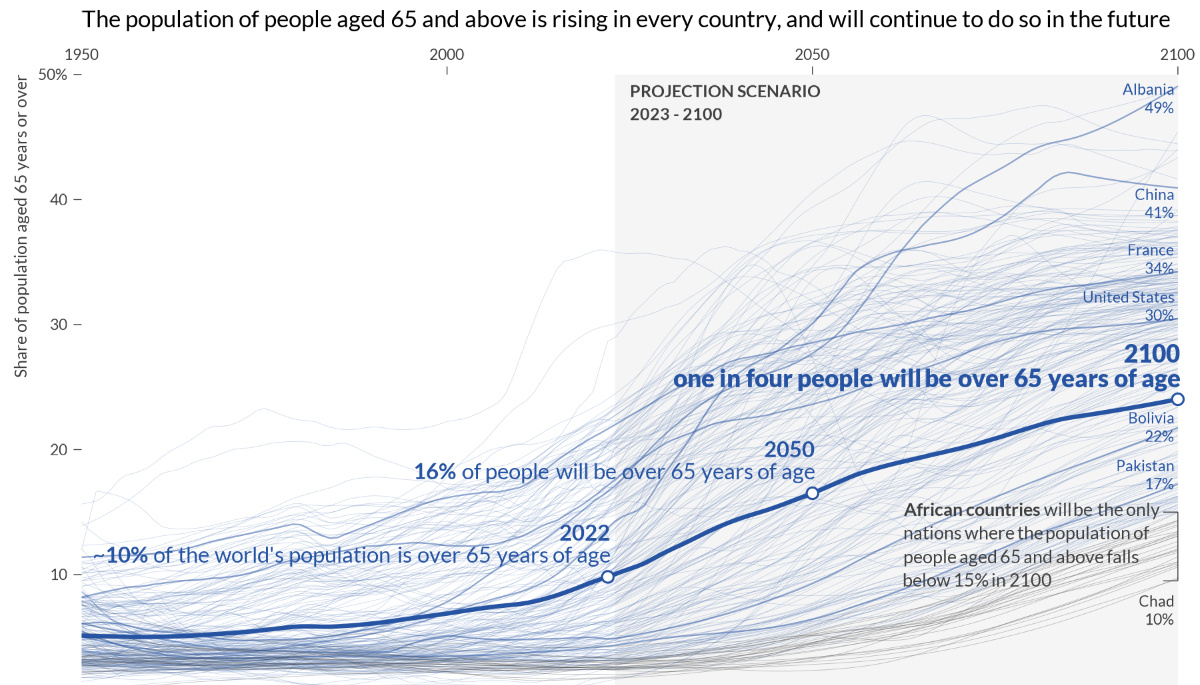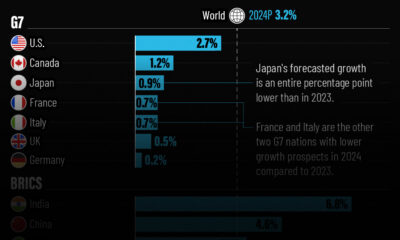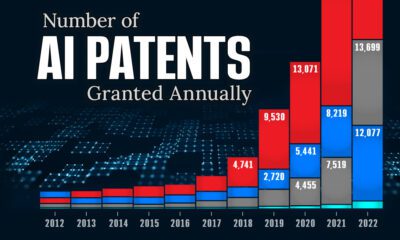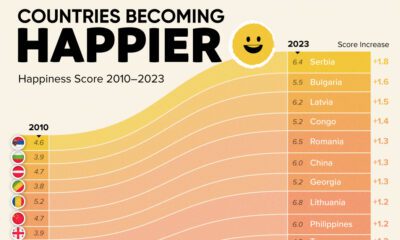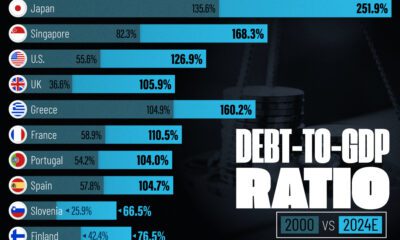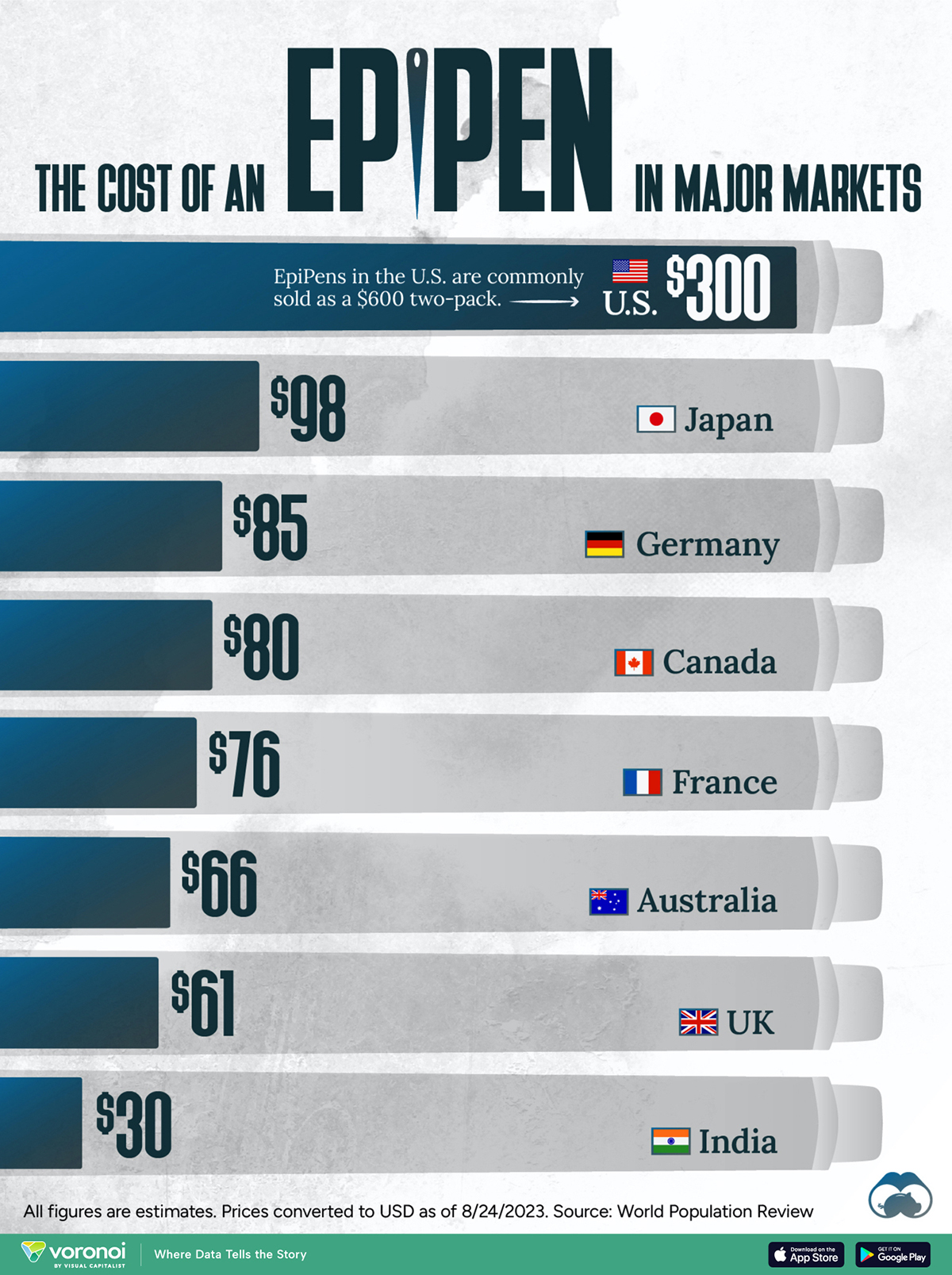Healthcare
Charted: The World’s Aging Population from 1950 to 2100
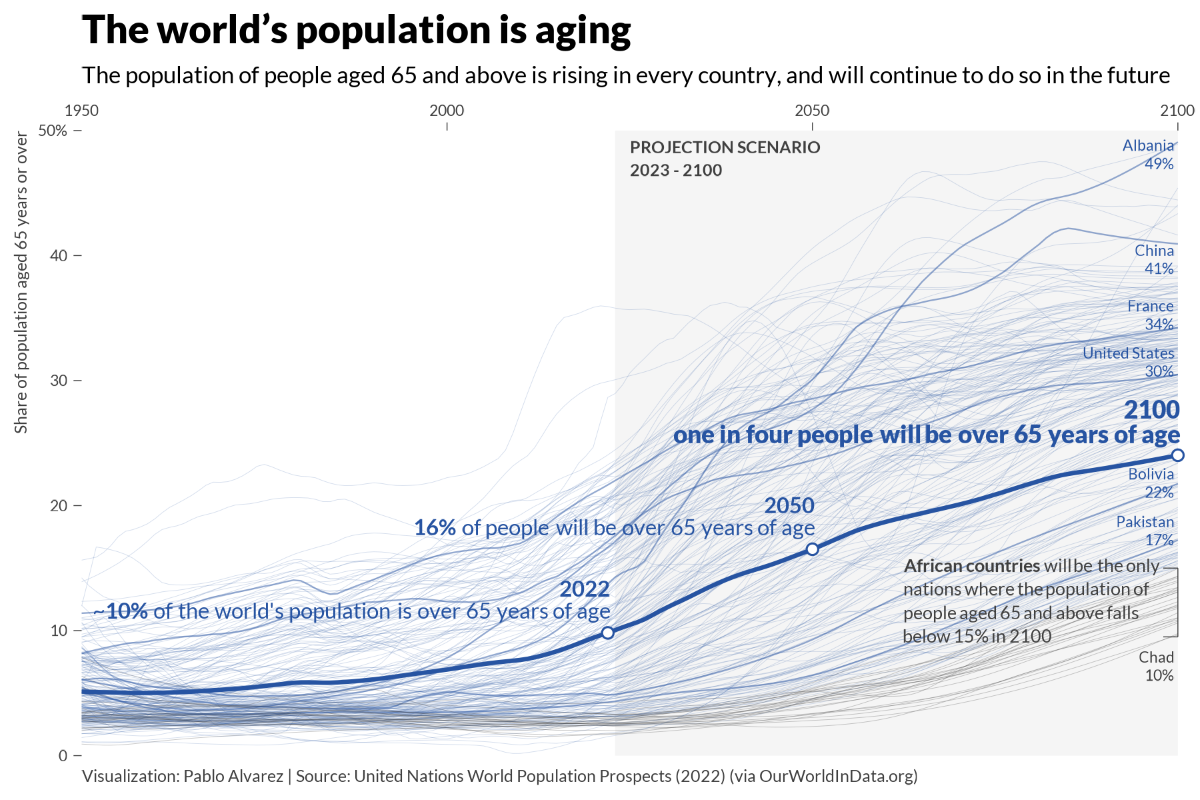
Charted: The World’s Aging Population from 1950 to 2100
As demographics continue to shift in the 21st century, the world’s aging population will continue to be a focal point for many global decision makers.
Most countries around the world have experienced population explosions, or are about to. Combine this with declining birth rates and falling mortality rates, and it’s clear that the global senior population will continue to reach new heights.
These graphics by Pablo Alvarez use data from the 2022 UN World Population Prospects to visualize this increasing aging population across countries.
The World’s Aging Population from 1950 to 2100
In 2022, there were 771 million people aged 65+ years globally, accounting for almost 10% of the world’s population.
This segment has been growing at an increasing rate, and it’s expected to hit 16% in 2050, and eventually 24% by 2100. Here’s what that’s projected to look like, for every country and territory.
| Country by Population Aged +65 Years | 1950 | 2022 | 2100 |
|---|---|---|---|
| 🇦🇫 Afghanistan | 2.85% | 2.39% | 16.03% |
| 🇦🇱 Albania | 6.04% | 16.66% | 49.08% |
| 🇩🇿 Algeria | 3.49% | 6.39% | 28.83% |
| 🇦🇸 American Samoa | 2.38% | 7.27% | 45.41% |
| 🇦🇩 Andorra | 10.02% | 14.98% | 37.04% |
| 🇦🇴 Angola | 2.93% | 2.6% | 12.07% |
| 🇦🇮 Anguilla | 3.69% | 10.71% | 37.49% |
| 🇦🇬 Antigua and Barbuda | 4.14% | 10.63% | 35.4% |
| 🇦🇷 Argentina | 4.13% | 11.92% | 31.79% |
| 🇦🇲 Armenia | 8.17% | 13.15% | 36.13% |
| 🇦🇼 Aruba | 1.77% | 16.15% | 36.51% |
| 🇦🇺 Australia | 8.17% | 16.9% | 31.38% |
| 🇦🇹 Austria | 10.42% | 19.81% | 33.93% |
| 🇦🇿 Azerbaijan | 6.89% | 7.11% | 30.5% |
| 🇧🇸 Bahamas | 4.76% | 8.89% | 29.58% |
| 🇧🇭 Bahrain | 2.88% | 3.76% | 21.89% |
| 🇧🇩 Bangladesh | 3.9% | 6.04% | 32.56% |
| 🇧🇧 Barbados | 5.24% | 16.28% | 33.19% |
| 🇧🇾 Belarus | 8.24% | 17.18% | 30.45% |
| 🇧🇪 Belgium | 11.03% | 19.73% | 32.83% |
| 🇧🇿 Belize | 3.57% | 5.09% | 29.21% |
| 🇧🇯 Benin | 7.85% | 3.06% | 11.03% |
| 🇧🇲 Bermuda | 5.71% | 20.41% | 37.73% |
| 🇧🇹 Bhutan | 2.53% | 6.25% | 33.35% |
| 🇧🇴 Bolivia | 6.11% | 4.85% | 21.75% |
| 🇧🇶 Bonaire Sint Eustatius and Saba | 14.22% | 13.84% | 28.94% |
| 🇧🇦 Bosnia and Herzegovina | 3.95% | 18.4% | 36.4% |
| 🇧🇼 Botswana | 4.32% | 3.65% | 17.96% |
| 🇧🇷 Brazil | 2.39% | 9.88% | 33.52% |
| 🇻🇬 British Virgin Islands | 8.63% | 9.95% | 32.47% |
| 🇧🇳 Brunei | 4.85% | 6.17% | 30.93% |
| 🇧🇬 Bulgaria | 6.66% | 22.38% | 37.13% |
| 🇧🇫 Burkina Faso | 2.01% | 2.53% | 13.07% |
| 🇧🇮 Burundi | 3.22% | 2.48% | 13.23% |
| 🇰🇭 Cambodia | 2.67% | 5.81% | 26.43% |
| 🇨🇲 Cameroon | 3.47% | 2.67% | 11.89% |
| 🇨🇦 Canada | 7.7% | 19.03% | 31.55% |
| 🇨🇻 Cape Verde | 3.67% | 5.55% | 32.63% |
| 🇰🇾 Cayman Islands | 6.05% | 8.17% | 28.75% |
| 🇨🇫 Central African Republic | 5.% | 2.51% | 11.43% |
| 🇹🇩 Chad | 4.33% | 2.01% | 9.64% |
| 🇨🇱 Chile | 3.3% | 13.03% | 36.61% |
| 🇨🇳 China | 5.04% | 13.72% | 40.93% |
| 🇨🇴 Colombia | 3.22% | 9.% | 34.49% |
| 🇰🇲 Comoros | 3.8% | 4.28% | 17.81% |
| 🇨🇬 Congo | 3.36% | 2.72% | 11.99% |
| 🇨🇰 Cook Islands | 2.94% | 11.73% | 29.75% |
| 🇨🇷 Costa Rica | 2.97% | 10.83% | 36.99% |
| 🇨🇮 Cote d'Ivoire | 2.21% | 2.4% | 10.86% |
| 🇭🇷 Croatia | 7.82% | 22.36% | 37.03% |
| 🇨🇺 Cuba | 4.36% | 15.81% | 36.31% |
| 🇨🇼 Curacao | 5.82% | 14.95% | 30.46% |
| 🇨🇾 Cyprus | 5.95% | 14.83% | 33.36% |
| 🇨🇿 Czechia | 8.29% | 20.64% | 26.94% |
| 🇨🇩 Democratic Republic of Congo | 3.77% | 2.92% | 10.62% |
| 🇩🇰 Denmark | 9.04% | 20.49% | 30.45% |
| 🇩🇯 Djibouti | 1.99% | 4.54% | 19.68% |
| 🇩🇲 Dominica | 7.67% | 9.53% | 34.28% |
| 🇩🇴 Dominican Republic | 2.72% | 7.4% | 30.47% |
| 🇪🇨 Ecuador | 5.2% | 7.83% | 31.97% |
| 🇪🇬 Egypt | 2.95% | 4.83% | 21.77% |
| 🇸🇻 El Salvador | 3.93% | 8.22% | 36.02% |
| 🇬🇶 Equatorial Guinea | 5.53% | 3.12% | 15.13% |
| 🇪🇷 Eritrea | 3.2% | 4.01% | 19.86% |
| 🇪🇪 Estonia | 10.56% | 20.58% | 34.15% |
| 🇸🇿 Eswatini | 2.68% | 4.% | 16.26% |
| 🇪🇹 Ethiopia | 3.01% | 3.14% | 18.6% |
| 🇫🇴 Faeroe Islands | 7.59% | 17.92% | 26.91% |
| 🇫🇰 Falkland Islands | 8.27% | 11.08% | 35.86% |
| 🇫🇯 Fiji | 5.99% | 5.9% | 20.6% |
| 🇫🇮 Finland | 6.63% | 23.27% | 34.04% |
| 🇫🇷 France | 11.39% | 21.66% | 34.23% |
| 🇬🇫 French Guiana | 7.96% | 5.98% | 21.13% |
| 🇵🇫 French Polynesia | 3.% | 10.07% | 37.85% |
| 🇬🇦 Gabon | 7.21% | 3.89% | 16.25% |
| 🇬🇲 Gambia | 2.5% | 2.43% | 16.06% |
| 🇬🇪 Georgia | 9.35% | 14.61% | 31.19% |
| 🇩🇪 Germany | 9.46% | 22.41% | 33.72% |
| 🇬🇭 Ghana | 4.62% | 3.55% | 15.91% |
| 🇬🇮 Gibraltar | 6.94% | 20.84% | 37.63% |
| 🇬🇷 Greece | 6.8% | 22.82% | 37.52% |
| 🇬🇱 Greenland | 3.06% | 10.02% | 29.16% |
| 🇬🇩 Grenada | 5.12% | 10.07% | 30.54% |
| 🇬🇵 Guadeloupe | 5.51% | 20.04% | 34.45% |
| 🇬🇺 Guam | 1.11% | 11.84% | 31.19% |
| 🇬🇹 Guatemala | 2.31% | 4.91% | 28.05% |
| 🇬🇬 Guernsey | 11.96% | 16.64% | 35.4% |
| 🇬🇳 Guinea | 5.39% | 3.32% | 14.% |
| 🇬🇼 Guinea-Bissau | 3.45% | 2.82% | 14.34% |
| 🇬🇾 Guyana | 3.89% | 6.28% | 28.94% |
| 🇭🇹 Haiti | 3.64% | 4.54% | 19.07% |
| 🇭🇳 Honduras | 3.96% | 4.27% | 26.5% |
| 🇭🇰 Hong Kong | 2.48% | 20.47% | 41.64% |
| 🇭🇺 Hungary | 7.81% | 20.01% | 31.85% |
| 🇮🇸 Iceland | 7.52% | 15.33% | 34.25% |
| 🇮🇳 India | 3.1% | 6.9% | 29.81% |
| 🇮🇩 Indonesia | 1.74% | 6.86% | 25.28% |
| 🇮🇷 Iran | 5.22% | 7.62% | 33.72% |
| 🇮🇶 Iraq | 2.79% | 3.41% | 18.44% |
| 🇮🇪 Ireland | 10.99% | 15.14% | 32.48% |
| 🇮🇲 Isle of Man | 13.9% | 22.29% | 31.8% |
| 🇮🇱 Israel | 4.% | 12.04% | 25.97% |
| 🇮🇹 Italy | 8.09% | 24.05% | 38.19% |
| 🇯🇲 Jamaica | 3.83% | 7.45% | 44.05% |
| 🇯🇵 Japan | 4.89% | 29.92% | 38.7% |
| 🇯🇪 Jersey | 12.34% | 16.22% | 30.52% |
| 🇯🇴 Jordan | 5.03% | 3.84% | 27.3% |
| 🇰🇿 Kazakhstan | 6.47% | 8.04% | 19.58% |
| 🇰🇪 Kenya | 5.28% | 2.87% | 16.98% |
| 🇰🇮 Kiribati | 7.13% | 3.81% | 17.33% |
| 🇽🇰 Kosovo | 5.33% | 10.19% | 43.35% |
| 🇰🇼 Kuwait | 2.88% | 4.93% | 31.56% |
| 🇰🇬 Kyrgyzstan | 7.91% | 4.54% | 21.08% |
| 🇱🇦 Laos | 2.13% | 4.45% | 25.24% |
| 🇱🇻 Latvia | 10.12% | 21.86% | 32.86% |
| 🇱🇧 Lebanon | 7.24% | 9.89% | 32.11% |
| 🇱🇸 Lesotho | 6.34% | 4.2% | 13.44% |
| 🇱🇷 Liberia | 2.97% | 3.31% | 13.88% |
| 🇱🇾 Libya | 5.21% | 4.86% | 27.77% |
| 🇱🇮 Liechtenstein | 7.89% | 19.37% | 34.79% |
| 🇱🇹 Lithuania | 8.65% | 20.8% | 32.79% |
| 🇱🇺 Luxembourg | 9.71% | 15.03% | 31.55% |
| 🇲🇴 Macao | 3.11% | 13.% | 32.39% |
| 🇲🇬 Madagascar | 3.25% | 3.35% | 16.21% |
| 🇲🇼 Malawi | 3.06% | 2.61% | 15.61% |
| 🇲🇾 Malaysia | 4.91% | 7.5% | 30.78% |
| 🇲🇻 Maldives | 3.14% | 4.78% | 35.61% |
| 🇲🇱 Mali | 2.78% | 2.38% | 11.% |
| 🇲🇹 Malta | 7.42% | 19.13% | 38.26% |
| 🇲🇭 Marshall Islands | 5.68% | 4.56% | 17.8% |
| 🇲🇶 Martinique | 5.85% | 22.77% | 37.31% |
| 🇲🇷 Mauritania | 1.44% | 3.22% | 15.03% |
| 🇲🇺 Mauritius | 3.18% | 12.79% | 33.76% |
| 🇾🇹 Mayotte | 6.61% | 2.88% | 18.15% |
| 🇲🇽 Mexico | 2.99% | 8.32% | 34.88% |
| 🇫🇲 Micronesia (country) | 4.11% | 6.16% | 27.59% |
| 🇲🇩 Moldova | 7.56% | 12.98% | 26.36% |
| 🇲🇨 Monaco | 15.64% | 35.92% | 30.16% |
| 🇲🇳 Mongolia | 3.87% | 4.61% | 26.18% |
| 🇲🇪 Montenegro | 7.85% | 16.55% | 34.16% |
| 🇲🇸 Montserrat | 7.92% | 17.7% | 33.05% |
| 🇲🇦 Morocco | 2.86% | 7.72% | 29.97% |
| 🇲🇿 Mozambique | 3.13% | 2.57% | 13.43% |
| 🇲🇲 Myanmar | 3.21% | 6.82% | 23.69% |
| 🇳🇦 Namibia | 4.1% | 3.97% | 15.38% |
| 🇳🇷 Nauru | 8.98% | 2.5% | 15.87% |
| 🇳🇵 Nepal | 2.74% | 6.09% | 29.51% |
| 🇳🇱 Netherlands | 7.76% | 20.31% | 32.89% |
| 🇳🇨 New Caledonia | 5.% | 11.02% | 31.61% |
| 🇳🇿 New Zealand | 9.09% | 16.31% | 33.2% |
| 🇳🇮 Nicaragua | 2.71% | 5.29% | 28.92% |
| 🇳🇪 Niger | .92% | 2.4% | 9.76% |
| 🇳🇬 Nigeria | 3.% | 2.97% | 12.31% |
| 🇳🇺 Niue | 4.79% | 15.16% | 22.55% |
| 🇰🇵 North Korea | 2.72% | 11.71% | 30.49% |
| 🇲🇰 North Macedonia | 5.87% | 14.91% | 36.56% |
| 🇲🇵 Northern Mariana Islands | 2.95% | 10.81% | 32.09% |
| 🇳🇴 Norway | 9.52% | 18.44% | 31.65% |
| 🇴🇲 Oman | 3.05% | 2.76% | 23.96% |
| 🇵🇰 Pakistan | 5.48% | 4.27% | 17.23% |
| 🇵🇼 Palau | 8.59% | 9.93% | 21.48% |
| 🇵🇸 Palestine | 4.77% | 3.53% | 23.44% |
| 🇵🇦 Panama | 3.57% | 8.77% | 30.03% |
| 🇵🇬 Papua New Guinea | 1.09% | 3.19% | 16.81% |
| 🇵🇾 Paraguay | 3.73% | 6.26% | 26.51% |
| 🇵🇪 Peru | 3.43% | 8.41% | 30.33% |
| 🇵🇭 Philippines | 3.56% | 5.44% | 23.38% |
| 🇵🇱 Poland | 5.22% | 18.55% | 35.69% |
| 🇵🇹 Portugal | 7.% | 22.9% | 36.28% |
| 🇵🇷 Puerto Rico | 3.63% | 22.93% | 48.9% |
| 🇶🇦 Qatar | 3.5% | 1.52% | 15.01% |
| 🇷🇪 Reunion | 3.81% | 13.28% | 32.4% |
| 🇷🇴 Romania | 7.16% | 18.64% | 32.22% |
| 🇷🇺 Russia | 4.8% | 15.8% | 27.86% |
| 🇷🇼 Rwanda | 2.76% | 3.2% | 17.36% |
| 🇧🇱 Saint Barthlemy | 7.3% | 10.61% | 43.89% |
| 🇸🇭 Saint Helena | 8.63% | 28.66% | 32.61% |
| 🇰🇳 Saint Kitts and Nevis | 5.36% | 10.13% | 29.79% |
| 🇱🇨 Saint Lucia | 3.59% | 9.23% | 33.39% |
| 🇲🇫 Saint Martin (French part) | 4.47% | 11.14% | 30.08% |
| 🇵🇲 Saint Pierre and Miquelon | 6.34% | 17.32% | 33.4% |
| 🇻🇨 Saint Vincent and the Grenadines | 7.71% | 10.86% | 32.34% |
| 🇼🇸 Samoa | 2.52% | 5.22% | 18.75% |
| 🇸🇲 San Marino | 10.15% | 20.47% | 35.73% |
| 🇸🇹 Sao Tome and Principe | 3.92% | 3.76% | 15.6% |
| 🇸🇦 Saudi Arabia | 3.32% | 2.81% | 30.28% |
| 🇸🇳 Senegal | 3.42% | 3.14% | 16.54% |
| 🇷🇸 Serbia | 6.15% | 20.56% | 37.55% |
| 🇸🇨 Seychelles | 10.68% | 8.16% | 28.84% |
| 🇸🇱 Sierra Leone | 3.02% | 3.14% | 15.52% |
| 🇸🇬 Singapore | 2.29% | 15.12% | 36.51% |
| 🇸🇽 Sint Maarten (Dutch part) | 12.03% | 10.57% | 34.51% |
| 🇸🇰 Slovakia | 6.63% | 16.98% | 33.4% |
| 🇸🇮 Slovenia | 7.52% | 20.96% | 33.59% |
| 🇸🇧 Solomon Islands | 4.03% | 3.47% | 15.29% |
| 🇸🇴 Somalia | 2.6% | 2.57% | 10.75% |
| 🇿🇦 South Africa | 4.06% | 5.89% | 20.55% |
| 🇰🇷 South Korea | 2.74% | 17.49% | 44.44% |
| 🇸🇸 South Sudan | 3.48% | 2.89% | 13.11% |
| 🇪🇸 Spain | 7.23% | 20.27% | 38.72% |
| 🇱🇰 Sri Lanka | 8.76% | 11.54% | 35.73% |
| 🇸🇩 Sudan | 3.03% | 3.5% | 13.28% |
| 🇸🇷 Suriname | 4.09% | 7.39% | 25.8% |
| 🇸🇪 Sweden | 10.19% | 20.25% | 31.83% |
| 🇨🇭 Switzerland | 9.49% | 19.31% | 32.61% |
| 🇸🇾 Syria | 7.66% | 4.68% | 24.62% |
| 🇹🇼 Taiwan | 2.11% | 16.71% | 37.32% |
| 🇹🇯 Tajikistan | 4.34% | 3.47% | 19.43% |
| 🇹🇿 Tanzania | 2.2% | 3.1% | 14.97% |
| 🇹🇭 Thailand | 3.21% | 15.21% | 39.17% |
| 🇹🇱 Timor | 3.14% | 5.21% | 25.42% |
| 🇹🇬 Togo | 4.29% | 3.13% | 11.77% |
| 🇹🇰 Tokelau | 4.7% | 8.66% | 25.03% |
| 🇹🇴 Tonga | 4.6% | 6.22% | 21.65% |
| 🇹🇹 Trinidad and Tobago | 3.93% | 11.52% | 32.67% |
| 🇹🇳 Tunisia | 4.4% | 9.02% | 31.24% |
| 🇹🇷 Turkey | 3.77% | 8.64% | 33.9% |
| 🇹🇲 Turkmenistan | 5.84% | 5.15% | 21.55% |
| 🇹🇨 Turks and Caicos Islands | 5.79% | 10.34% | 28.25% |
| 🇹🇻 Tuvalu | 4.98% | 6.48% | 16.15% |
| 🇺🇬 Uganda | 2.87% | 1.69% | 14.33% |
| 🇺🇦 Ukraine | 7.54% | 18.81% | 33.2% |
| 🇦🇪 United Arab Emirates | 3.35% | 1.83% | 15.77% |
| 🇬🇧 United Kingdom | 10.84% | 19.17% | 32.56% |
| 🇺🇸 United States | 8.18% | 17.13% | 30.47% |
| 🇻🇮 United States Virgin Islands | 7.54% | 20.42% | 39.11% |
| 🇺🇾 Uruguay | 8.23% | 15.58% | 35.98% |
| 🇺🇿 Uzbekistan | 5.87% | 5.14% | 22.24% |
| 🇻🇺 Vanuatu | 5.65% | 3.74% | 16.29% |
| 🇻🇪 Venezuela | 2.29% | 8.61% | 27.71% |
| 🇻🇳 Vietnam | 4.13% | 9.12% | 30.02% |
| 🇼🇫 Wallis and Futuna | 1.76% | 13.47% | 32.98% |
| 🇪🇭 Western Sahara | 2.82% | 5.84% | 23.73% |
| 🇾🇪 Yemen | 3.98% | 2.66% | 18.25% |
| 🇿🇲 Zambia | 2.76% | 1.75% | 12.66% |
| 🇿🇼 Zimbabwe | 3.18% | 3.32% | 14.22% |
| 🌐 World | 5.13% | 9.82% | 24.03% |
Some of the places with high elderly shares today include high-income countries like Japan (30%), Italy (24%), and Finland (23%).
The lowest shares are concentrated in the Middle East and Africa. Many countries have just 2% of their population aged 65 years and older, such as Qatar, Uganda, and Afghanistan.
But over time, almost all countries are expected to see their older population segments grow. In just three decades, it is estimated that one-in-four European, North American, and Asian residents will be over 65 years of age.
By 2100, a variety of Asian countries and island nations facing low population growth are expected to see more than one-third of their populations aged 65 years or older, including South Korea and Jamaica at 44%. However, it’s actually Albania that’s the biggest outlier overall, with a projected 49% of its population to be aged 65 and older by 2100.
Passing the Generational Torch
The challenge of an aging population is set to impact all sectors of society, including labor and financial markets, demand for housing and transportation, and especially family structures and intergenerational ties.
One way to help grasp the nature of transition is to note the changing ratio between seniors and young children in the world population, as seen in the below crossover diagram:
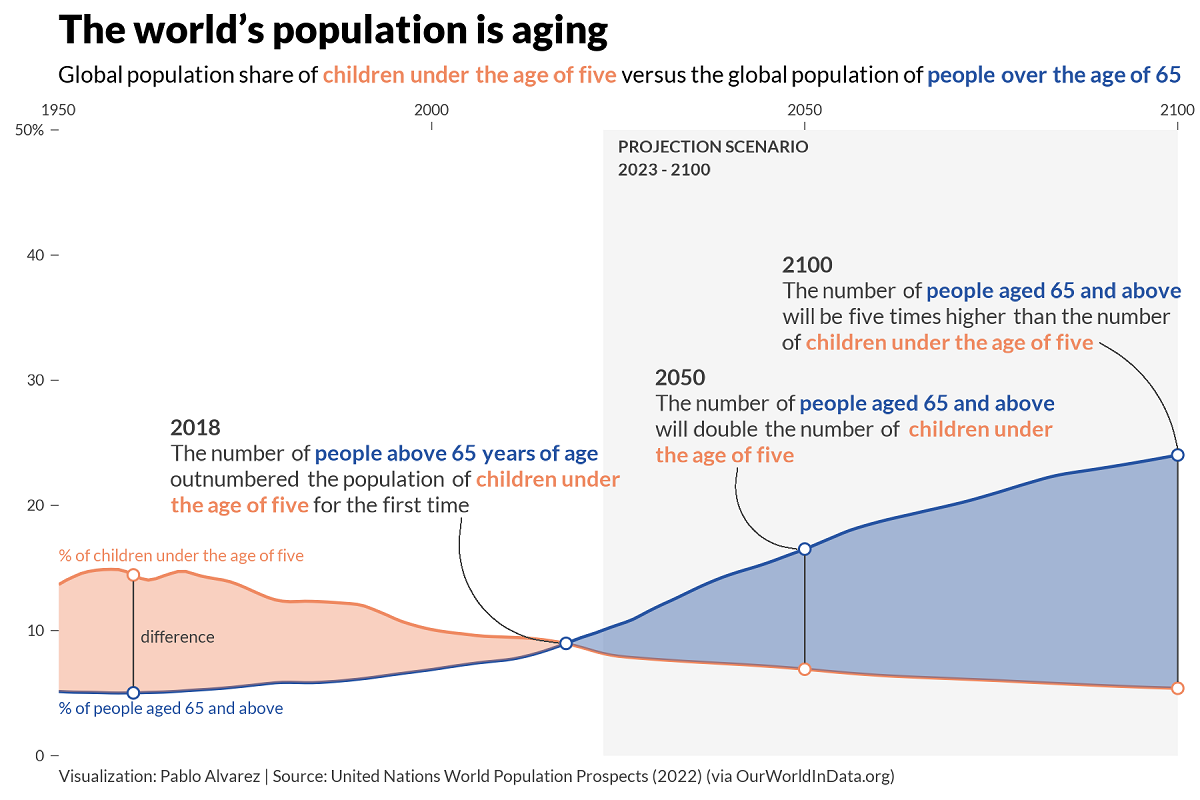
Dropping fertility rates, in addition to improved child and infant mortality rates, are known to have played a major role in the plateauing population of children.
However, not all countries have witnessed this crossover yet, as it usually coincides with higher levels of economic development.
As countries such as India, Brazil, and South Africa reach higher levels of per capita income, they will be likely to follow down the paths of more advanced economies, eventually experiencing similar demographic fates and challenges.

This article was published as a part of Visual Capitalist's Creator Program, which features data-driven visuals from some of our favorite Creators around the world.
Healthcare
The Cost of an EpiPen in Major Markets
This visualization compares EpiPen prices around the world, with the U.S. having the highest prices by far.
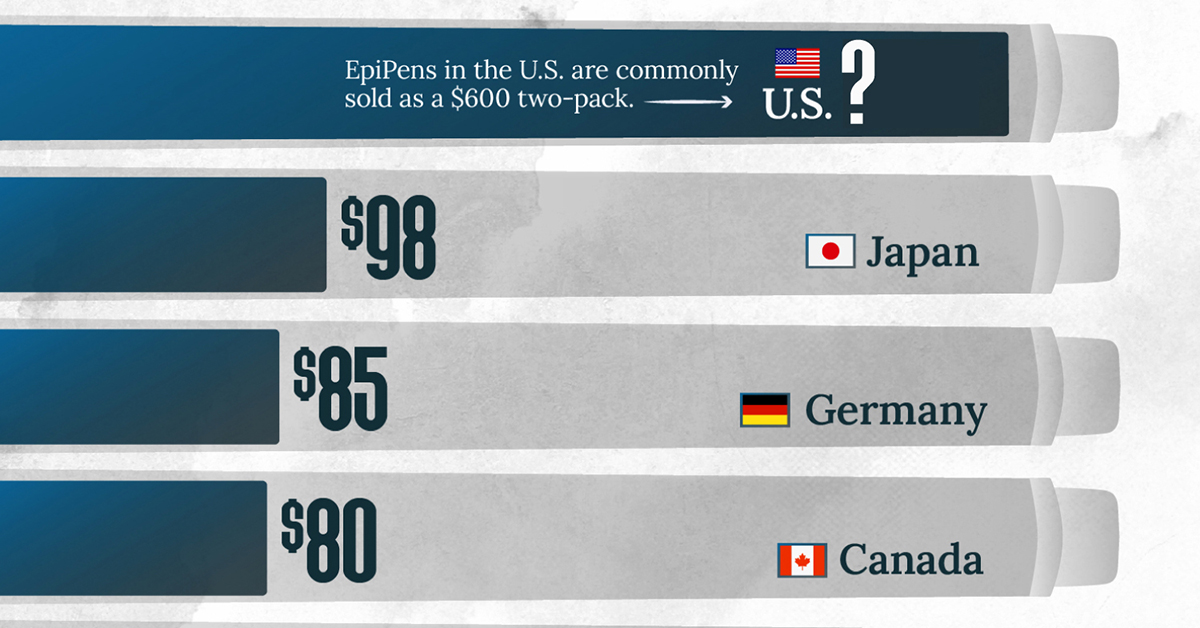
The Cost of an EpiPen in Major Markets
This was originally posted on our Voronoi app. Download the app for free on iOS or Android and discover incredible data-driven charts from a variety of trusted sources.
EpiPens are auto-injectors containing epinephrine, a drug that can treat or reverse severe allergic reactions, potentially preventing death.
The global epinephrine market was valued at $1.75 billion in 2022 and is projected to reach $4.08 billion by 2030. North America represents over 60% of the market.
EpiPens, however, can be prohibitively expensive in some regions.
In this graphic, we present estimated EpiPen prices in major global markets, compiled by World Population Review and converted to U.S. dollars as of August 2023.
Why are U.S. Prices so High?
The U.S. stands out as the most expensive market for EpiPens, despite over 1 million Americans having epinephrine prescriptions. After Mylan (now part of Pfizer) acquired the rights to produce EpiPens in the U.S. in 2007, the cost of a two-pack skyrocketed to $600, up from about $60.
| Country | Price (USD) |
|---|---|
| 🇺🇸 U.S. | 300* |
| 🇯🇵 Japan | 98 |
| 🇩🇪 Germany | 85 |
| 🇨🇦 Canada | 80 |
| 🇫🇷 France | 76 |
| 🇦🇺 Australia | 66 |
| 🇬🇧 UK | 61 |
| 🇮🇳 India | 30 |
*Per unit cost. Commonly sold as a two-pack, meaning total cost is equal to $600
Former Mylan CEO Heather Bresch defended the price hikes to Congress, citing minimal profit margins. Mylan eventually settled with the U.S. government for a nine-figure sum.
Notably, EpiPens are available at a fraction of the cost in other developed countries like Japan, Germany, and Canada.
Making EpiPens More Affordable
Efforts to improve EpiPen affordability are underway in several U.S. states. For instance, the Colorado House approved a $60 price cap on epinephrine, now under review by the state Senate.
Similar measures in Rhode Island, Delaware, Missouri, and Vermont aim to ensure insurance coverage for epinephrine, which is not currently mandatory, although most health plans cover it.
-
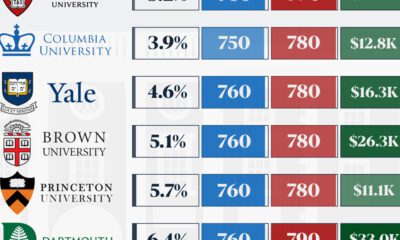
 Education1 week ago
Education1 week agoHow Hard Is It to Get Into an Ivy League School?
-

 Technology2 weeks ago
Technology2 weeks agoRanked: Semiconductor Companies by Industry Revenue Share
-

 Markets2 weeks ago
Markets2 weeks agoRanked: The World’s Top Flight Routes, by Revenue
-

 Demographics2 weeks ago
Demographics2 weeks agoPopulation Projections: The World’s 6 Largest Countries in 2075
-

 Markets2 weeks ago
Markets2 weeks agoThe Top 10 States by Real GDP Growth in 2023
-

 Demographics2 weeks ago
Demographics2 weeks agoThe Smallest Gender Wage Gaps in OECD Countries
-

 Economy2 weeks ago
Economy2 weeks agoWhere U.S. Inflation Hit the Hardest in March 2024
-

 Environment2 weeks ago
Environment2 weeks agoTop Countries By Forest Growth Since 2001
